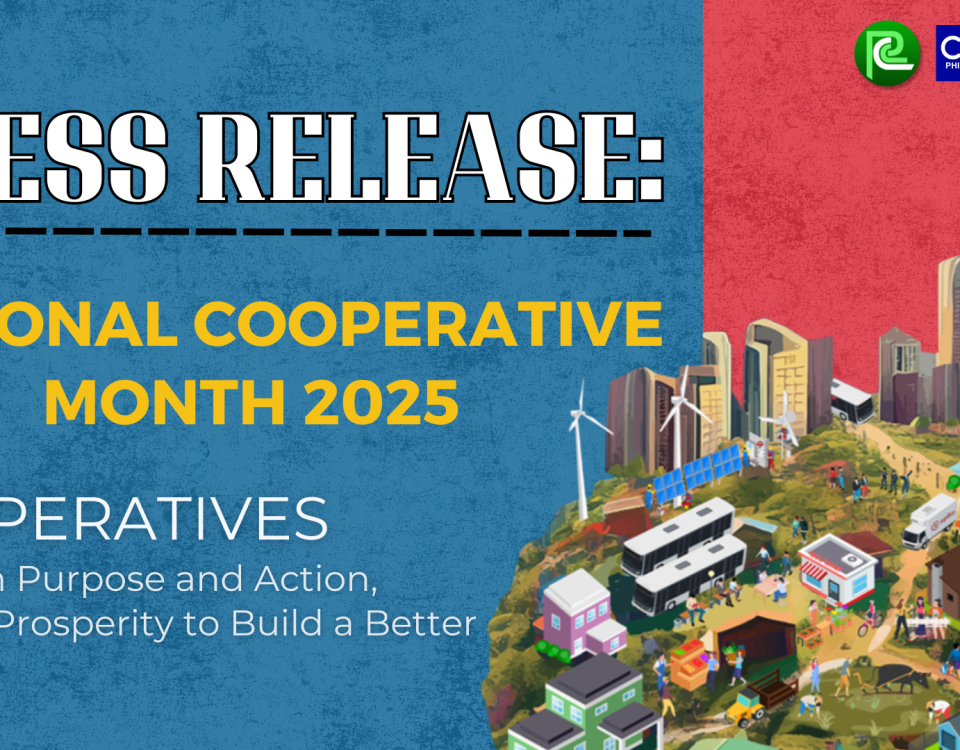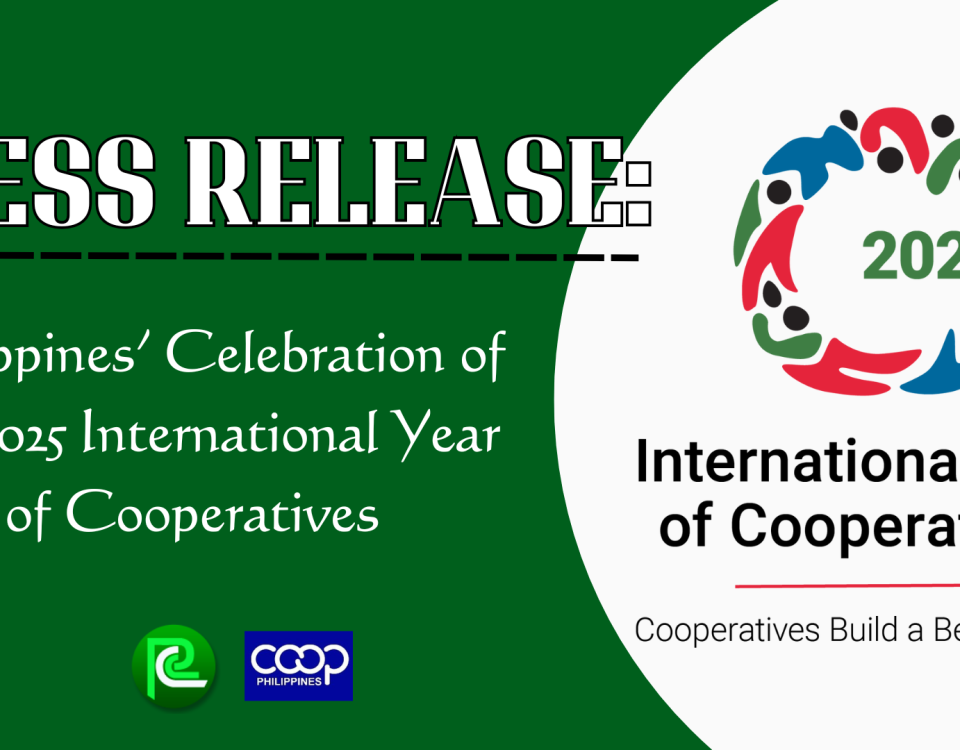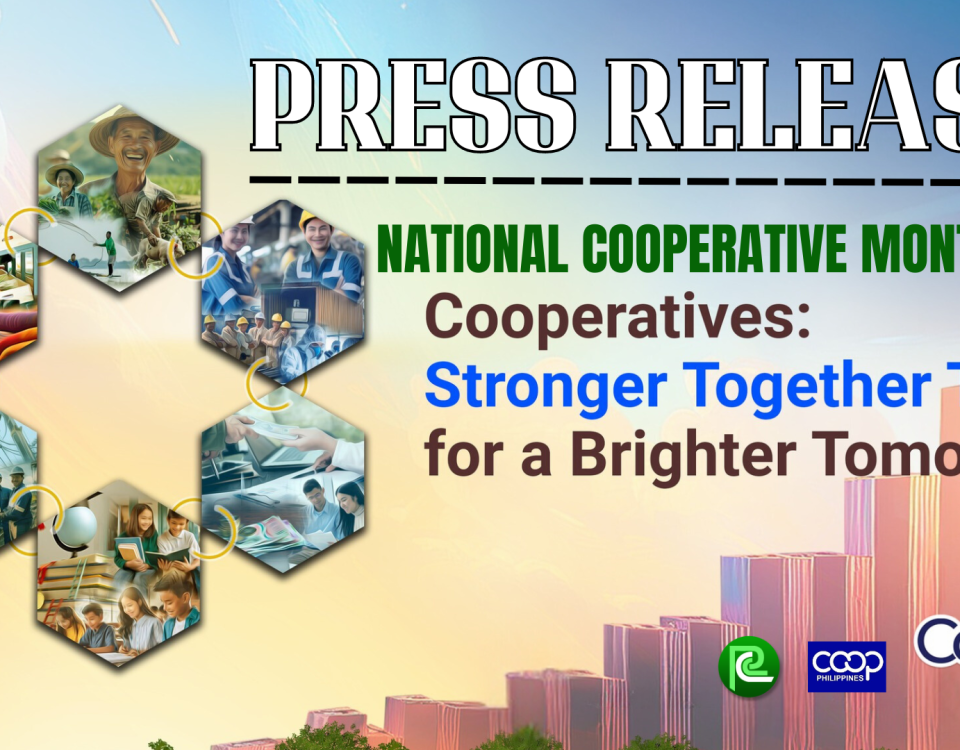
ICA Webinar Post Covid 19 Response of the Philippine Cooperative Sector
May 27, 2020
COOPERATIVES’ RELIEF OPERATIONS FOR NCR COOPERATIVES
May 29, 2020
The different forms of assistance continue non-stop. Whatever these may be, they all represent the movement as true soldiers of compassion who are ready to join the battlefront with aid in various forms. Just as the movement has proven to be reliable partners of the government in times of crisis, let us also hail all those entities—big or small, federations or primary coops—for bringing in more cheer and upliftment to the beneficiaries they have in the different communities.
In good times or in bad, cooperatives will always be here to prove their mettle in countless ways, to be of service to the people, not only in terms of value for money, but value for the dignity of people. And for that let mainstream society salute all their efforts as silent heroes who make a big difference!
LUZON
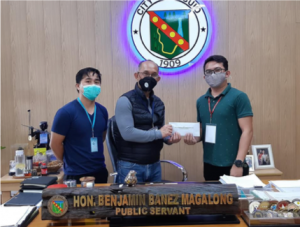
- Disenyo Pandi Cooperative, Bulacan: the production of attractively coloured yet practical PPEs for health workers, to ease the lack of these equipment as demand outstrips supply by the day. . .
- Baguio Entrepreneurs Credit Cooperative (BEC COOP): a P50,000.00 donation to the office of Baguio City Mayor Benjamin Magalong.
- Under its COOP HELP-DAMAYAN VS COVID-19 program Batch 1, Sacred Heart Cooperative (through the concerted efforts of its 187 members as well as staff and officers who contributed to this effort) the distribution of grocery packs consisting of 5kgs. of rice, coffee, sugar, milk and biscuits) to 200 households in Bgys. Mabalas-balas, Diliman-1, Pasong Inchik, Maguinao, Capihan, Maronquillo, Bangkal, Capihan, Tamroof and Bangka-bangaka in Bulacan. Assisting in the distribution of these goods was AYOS San Rafael (Alliance of Youth of San Rafael).
- As part of the We Fight and Heal As One campaign, the Provincial Cooperative Development Council-Bulacan and the Provincial Government of Bulacan partnered with PFCCO-Central Luzon for the donation of washable PPEs, face shields, and bottles of alcohol to the frontliners of Bulacan Medical Center.
- Reliance Producers’ Cooperative, Carmona, Cavite: the manufacture, since April 8, of 600 lab gowns, 500 jump suits, and 1,000 face masks per day with 300 member-workers for distribution to health workers . . .
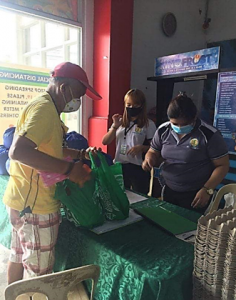
- Soro-Soro Ibaba Development Cooperative: distribution of Family Food Packs to both regular and associate members in San Miguel, Sirang Lupa, Pinamucan Proper, Pinamucan East, Conde Labac, Conde Itaas, Sto. Domingo, Mahacot East, Mahacot West, San Pedro, Sta. Rita Kalsada, Sta. Rita Aplaya, Sta. Rita Aplaya and Bugok, Batangas City; OSS Calabanga and ATF Pili in Bicol; as well as to members and communities in Roxas, Matungao, Socorro, Baco, Bongabong and Gloria, Oriental Mindoro . . .
- Irrigation service for affected farmers, relief goods for selected families from Bgys.San Agustin and San Ramon and free hybrid seeds paid by farmer-members courtesy of SARFC Coop, Cam Sur . . .
- Sapang Palay Minuyan Loop TSC in SJDM Bulacan facilitated the repacking and distribution of 10 kgs. Of rice and face masks to each of their members.
- Ibaan Market Vendors & Community Multi-Purpose Cooperative – provided assistance to LGBT Community of Ibaan.
- Abra Diocesian Teachers and Employees Multipurpose Cooperative (ADTEMPCO) deployed rolling stores in partnership with DTI and LGUs.
- James the Apostle Multipurpose Cooperative satellite offices in Lubao and San Fernando Pampanga donates 5 sacks of rice for Barangay relief operations .
VISAYAS
- FSSI/Foundation for a Sustainable Society: in partnership with Danao Agrarian Reform Cooperative, food assistance to members and the community at Bgy. Poblacion, Danao, Bohol.
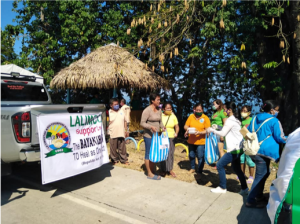
- Kooperatiba Naton MPC, Iloilo: distributing more rounds of snacks to frontliners in the municipality of Tigbauan . . .
- Food packs distributed to front liners in disinfection stations, check points, PNP personnel and health workers La Libertad, Negros Oriental, courtesy of LALIMCO/La Libertad MPC .
- In partnership with PFCCO Visayas under the aegis of ONE-Coop Neg. Or., financial assistance to members of Valencia Plants Growers’ Association, with the objective of reaching out to marginalized families in Negros Oriental during the Covid-19 pandemic by helping local governments facilitate and manage available resources donated and pooled together by active cooperatives and other generous private individuals.
- City Cooperative Development Livelihood Office, Bacolod City: the contracting of home-based sewers to produce face masks, which are made under strict sanitation/hygienic standards. The City Health Office (CHO) has deployed sanitation inspectors to check the home workplace sites of the sewers allowed to participate in the program. Then, the finished products are brought to the City Disaster Risk Reduction and Management Office (CDRRMO) for centralized disinfection and packing and eventually distributed to the frontliners all around the city as identified by the CHO and the CDRRMO. . .
- Lamac MPC, Cebu: distribution of relief goods from its members at its Tubigon Branch Office .


- The donation of 62 bags each containing 25 kilos of rice to frontliners, courtesy of Barbara Katilingbanon Credit Cooperative which were distributed to six fire stations, six regional health units, six police stations, the provincial and medicare hospitals, eight parishes and three UCCP churches . . .
- Fairchild Cebu Community MPC: donation of relief goods to the hardest-hit barangay with 82 positive COVID-19 cases, Bgy Zapatera . . .
MINDANAO
- Fresh Fruit Homemakers Consumer Cooperative extended help thru distribution of relief packs.
- Extended assistance via relief goods distributed to members and the community in Mahayhay, Medina Misamis Oriental by Fresh Fruit Homemakers Consumers Cooperative . . .
- Iligan City Government MPC: the initiation of sari-sari stores for both members and non-members, featuring fresh produce grown from Sikyop Agricultural Coop, Rogongon, Iligan City . . .
- Samal Island MPC: donation of goods to front liners, during which the coop expressed their heartfelt thanks for their ‘service and sacrifice’ . . .
- Paceman MPC, Medina, Misamis Oriental: 1,000 PPEs and rice distributed to its members . . .
- TACEMPCO, Tagum City: repacking and distribution of 10 kilos rice for its members . . .
- Northern Mindanao federation of Transport Cooperatives: 10 jeepneys being used for transporting frontliners in Iligan City . . .
- Mindanao State University – Iligan Institute of Technology National MPC (MSU-IIT NMPC) : distribution of food packs to front liners in Iligan, GenSan, and Davao Cities from its Cagayan de Oro and Lanao del Norte branches . . .

- Libreng Sakay program, through the utilization of five multicabs in partnership with the LTFRB Region 10 Office, Gingoog City and Misamis Oriental and Medina Gingoog Operator Driver Transport Coop for ferrying health workers and other staff to and from three hospitals in the city . . .
- The provision of rice and essential packs of basics to stranded students, and the donation of cash for PPE and medicine purchases, courtesy of Bukidnon State University Employees MPC . . .
- Donation of rice to barangay Zambowood, from Banco Cooperatiba DE Zamboanga . . .
- Integrated Livestock & Poultry Raisers Multipurpose Cooperative (ILIPCO) in Cagayan De Oro City provided daily meals and snacks to employees for 44 days (March 18– May 1, 2020), distributed goods & commodities to surrounding communities (April 29-30, 2020) and also to its employees (May 5-8, 2020).
- DARBC – Dolefil Agrarian Reform Beneficiaries Cooperative – More than 6,000 DARBC members residing in South Cotabato and General Santos City benefited during the 5-day relief goods distribution last April 3 to April 7, 2

- Northern Mindanao Medical Center Multipurpose Cooperative in Cagayan De Oro City donated P100,000.00 to Northern Mindanao Medical Center for its COVID-19 operations.
NATIONAL CAPITAL REGION

- Welcome Rotonda MPC: packed goods being distributed to both members and communities as part of its Koop Laban sa Covid 19 relief operation program . . .
- Baclaran Vendors Development Cooperative: donation of food items to frontliners.
- Pag-Asa MPC, Valenzuela City: the provision of six kilos rice to regular members, in addition to 75 kilos of rice to tricycle drivers serving the constituency and five rice sacks to barangay constituents.
- NFA MPC, in partnership with NCRL-PFCCO have undertaken the distribution of vitamins, soap, alcohol and noodles to the frontliners of Bgy. Vasra/ the giving of surgical masks to frontliners of health Service Command, V. Luna Ave., QC and Army General Hospital, Taguig City—in addition to providing P1,000 financial assistance to its members through the payroll/bank accounts.
- Manila Shared Services Employees and Credit Savings Cooperative, Makati City: cash donation of P50,000 to the Philippine General Hospital Medical Foundation, Inc. for the purchase of PPEs for health workers and front liners/ the distribution of hand sanitizers for members . In pursuant to the Implementing Rules and Regulations (IRR) of Section 4(aa) of R.A. No.11469 otherwise known as the “Bayanihan to Heal as One Act” last April 1, 2020, the MSSC Cooperative implemented a 30-day grace period for loans and interest payments to provide financial relief to loan member-borrowers for May 2020 with scheduled loan amortization and interest payments with guidelines as followed:
– Collection of payment to resume on the next due date immediately following the lapse of the grace period.
– No penalty fees will be charged
– The original maturity date of the loan shall be extended for a period equivalent to the grace period.
- A partnership with farmers from Almondian through the purchase of 1,000 kilos fresh produce sold to its members by PhilHealth Kapamilya MPC, also as part of its support for farmers. These agricultural items were sold by the cooperative during its Agri Market held last April 7 and 21 at the Philhealth Kapamilya MPC GAD Canteen.

- Relief assistance of P200 to all active members, automatically credited to their regular savings accounts courtesy of NEC MPC.
- Financial support worth P1,500 for MEVs, P750 for non-MEVs, P500 advance Birthday cash gift and 2,400 bottles (500 ml) of mineral water for Sta. Ana Hospital frontliners given by Yakult Employees Credit Cooperative . . .
- San Juan de la Cruz Parish MPC: interest on share capital, patronage refund and cash relief for members . . .
PHOTO GALLERY
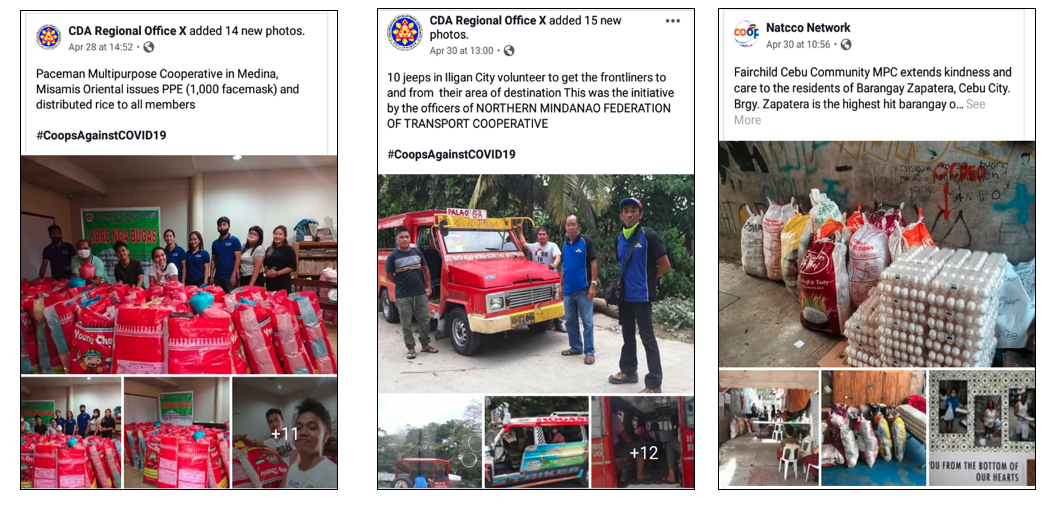
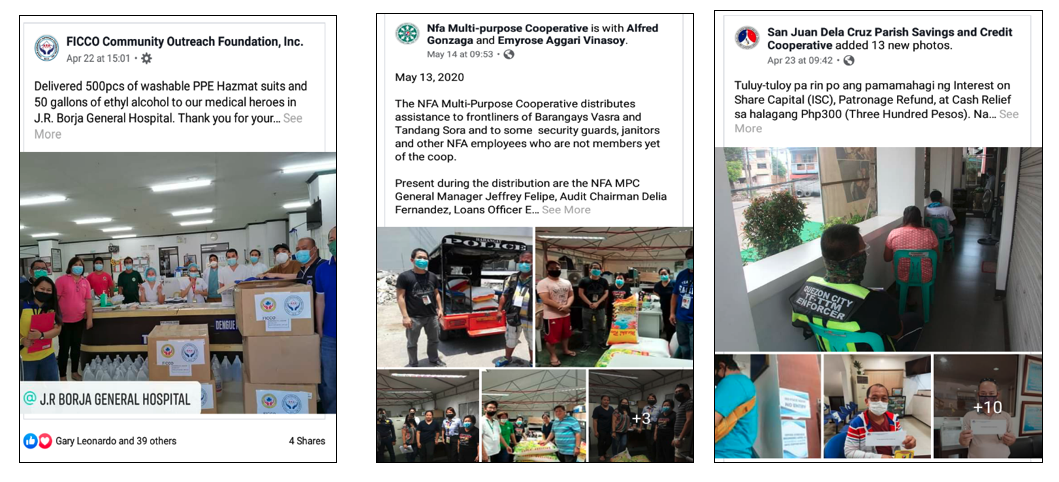
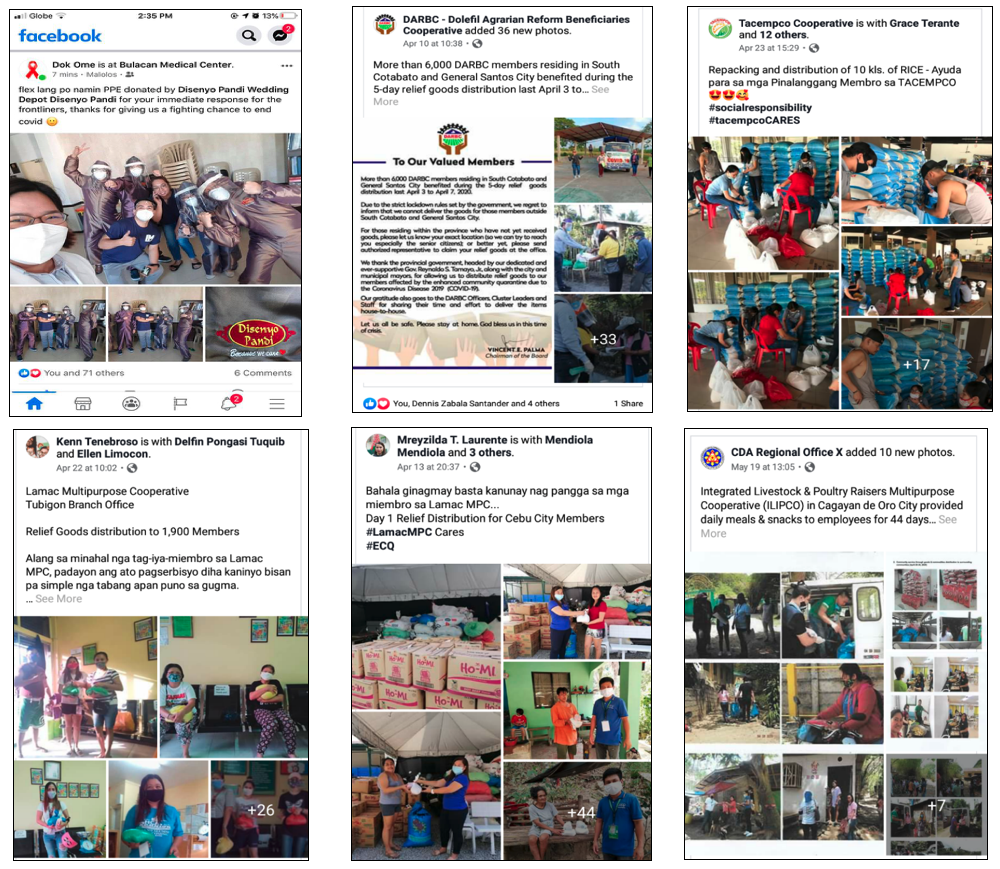
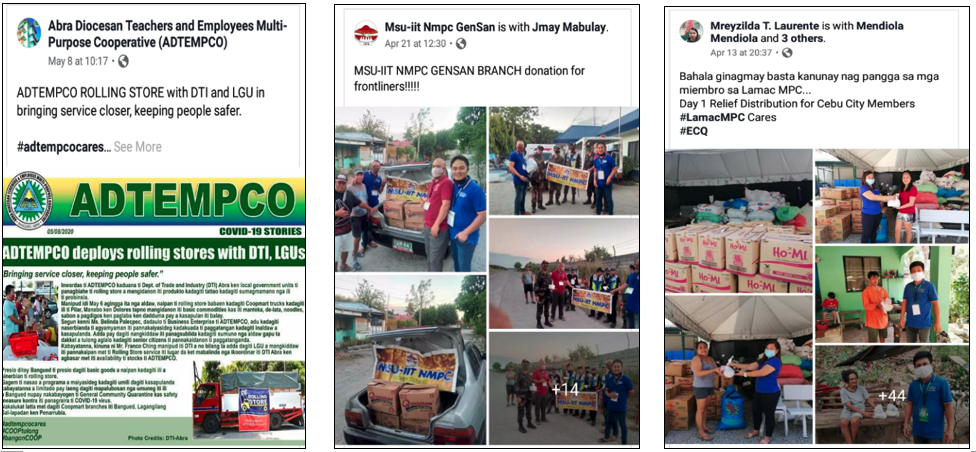
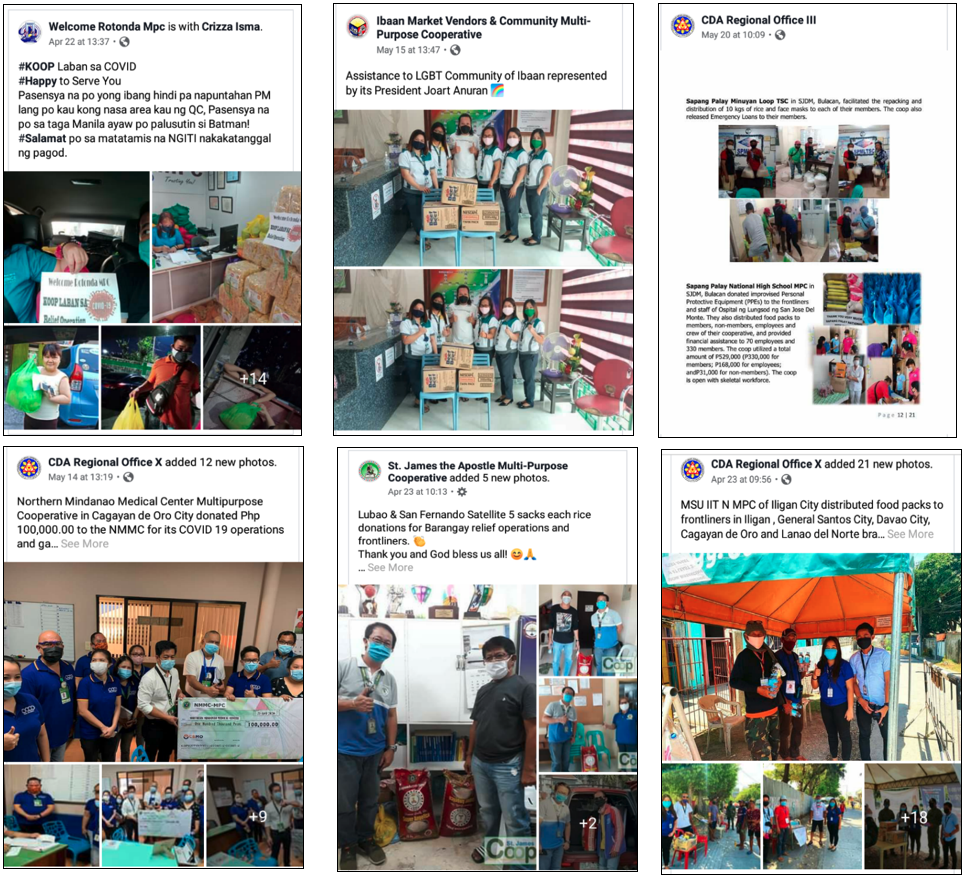
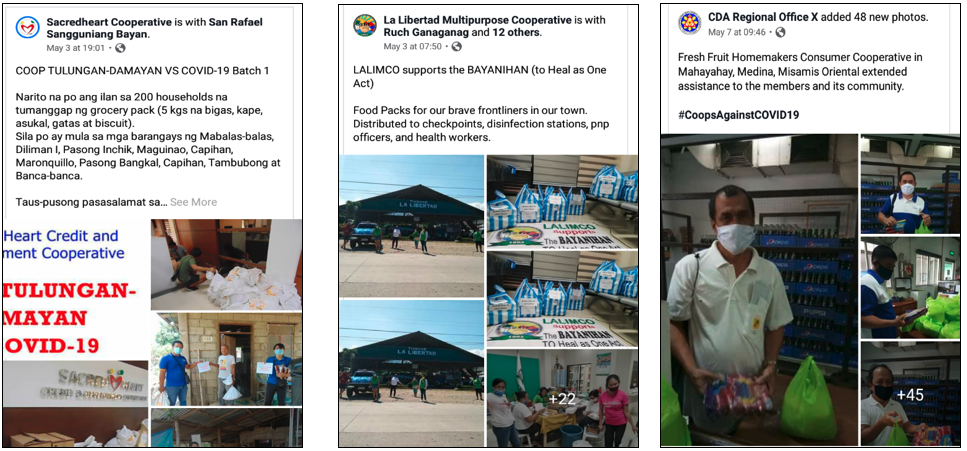
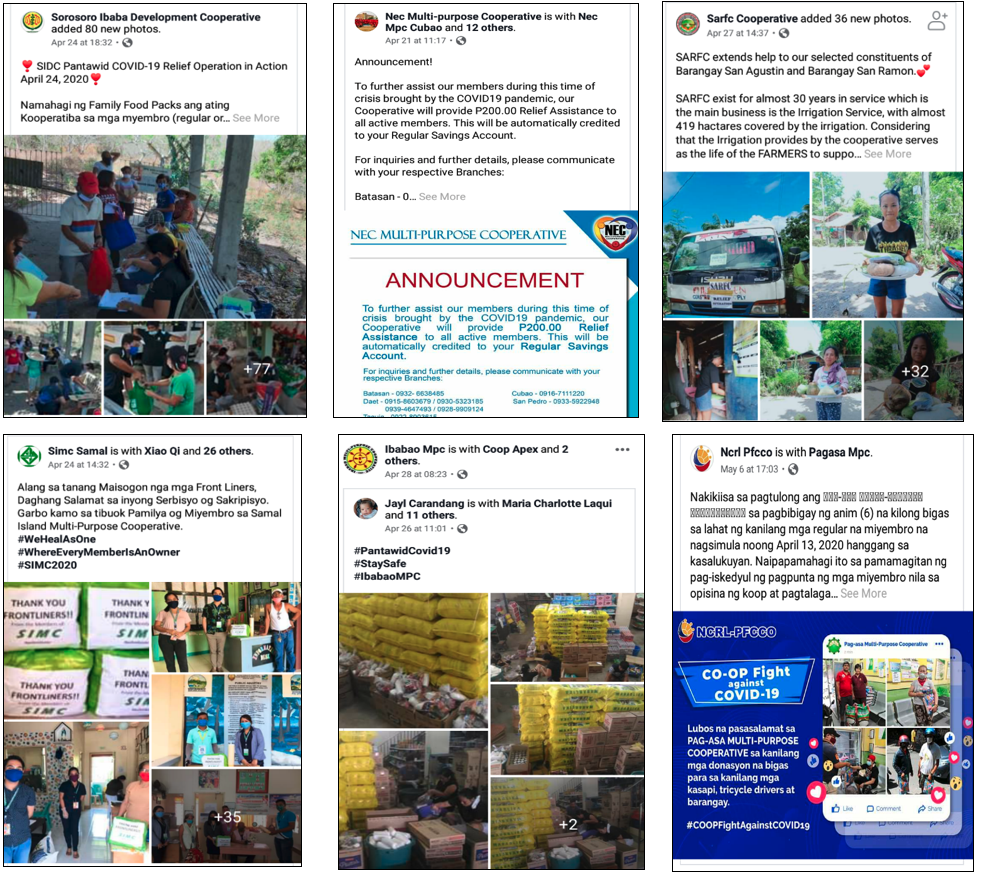
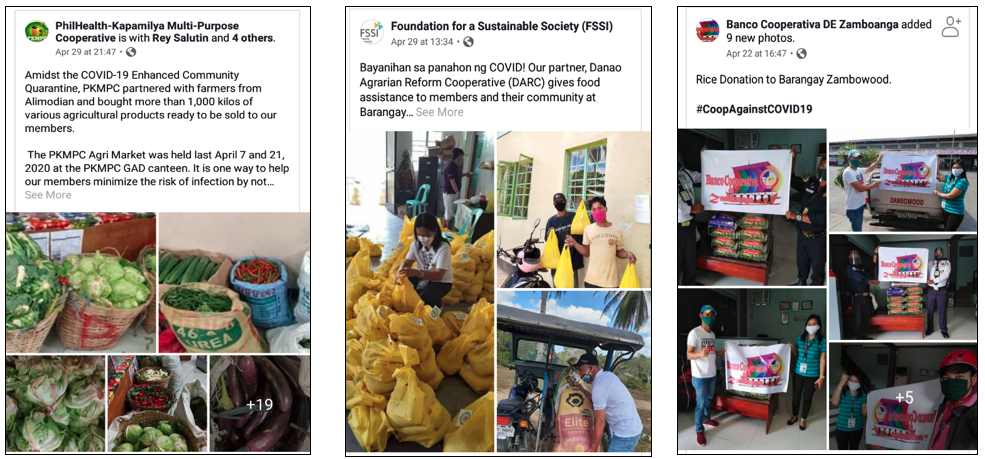
OTHER COOP ACTIVITIES
Electric cooperatives

http://web.philreca.org/all-121-electric-cooperatives-to-implement-the-pantawid-liwanag-program/
The Philippine Rural Electric Cooperatives Association, Inc. (PHILRECA) as well as the National Association of General Managers of Electric Cooperatives, Inc. (NAGMEC) has initiated the Pantawid Liwanag program which will provide aid to electric cooperatives that includes a ‘bill subsidy benefit’ in its Social Amelioration Program as part of the Bayanihan to Heal As One Act. Beneficiaries of Pantawid Liwanag include:
— consumers without regular work or income;
— consumers with regular jobs but have difficulties paying their electric bills;
— consumers greatly affected by the lockdown/ECQ;
— those who are ‘lifeline consumers’
The said program will be implemented in locations which are under the franchise of electric cooperatives; those under private distribution utilities will abide by their own programs.
Farmers’ cooperatives as frontliners
Thanks to a news released by the Department of Agrarian Reform/DAR farmers’ cooperatives also have shown their invaluable role as frontliners who feed medical frontliners and put food on the tables of Filipinos during the lockdown period. Though those who till the field and reap harvests do not need to wear face masks and PPEs, these farmers, who have bonded themselves as cooperatives, perform their role in sustainable development both for their members and the communities they serve.

(https://www.dar.gov.ph/articles/dar-in-the-news/101565 )
The report cites the case of Aklan province where frontliners in Kalibo, Numancia and Makato have benefitted from donations of 220 bottles of Talbo C (an FDA-approved and locally-produced juice drink from calamansi and talbos ng kamote) and 23 packs of biscuits courtesy of Numancia Vegetables and Fruit Farmers Multipurpose Cooperative (NVFFMPC)
Households Napaan in Malay towns received210 food packs at P200 pesos per pack from Kalipunan ng Maliliit na Magniniyog ng Napaan (KAMMANA MPC).
In Kabulihan, Malay, Kabulihan Coconut Farmers MPC 120 house holds were food packs consisting of rice, sardines, noodles, coffee and sugar.
In the town of Ibajay, Aparicio Agrarian Reform Cooperative and Monlaque Agrarian Reform Cooperative enabled each member to borrow money in the form of basic goods through the coop store,
Meanwhile in Buruanga, the Balusbos, El Progreso, Nazareth, Tag-osip, Cabugan and Habana or BENTCH Agrarian Reform Coop supported its members affected by the crisis through rice loans.
In Makato, the Libang Irrigators Association Reducing the rice milling cost from P2.50 to P2.00 per kilo of their rolling store mill for all members and non-members, was implemented by the Makato-based Libang Irrigators Association.
Moreover, eggplants produced by the demo farm of the Tagas Farmers MPC in Tangalan were distributed to both members and non-members. Producing fermented wild ginger as substitute rubbing alcohol and opening their nursery to the community to harvest ginger as herbal anti-cough remedy was the contribution of the Rosario Multipurpose Cooperative of Rosario, Malinao, Aklan to their community—in addition to distributing 18 sacks of rice to 30 4Ps households in the area.
In Altavas, the Man-Up Multipurpose Cooperative provided foot dip to the Barangay Hall and checkpoint in Brgy. Cabangila, made of coco peat from their coco oil mill.
DBP assistance for transport coops vis-à-vis PUV modernization
In line with the ‘new normal’ triggered by the COVID 19 pandemic and in support of the government’s PUV modernization program, the state-owned Development Bank of the Philippines has included transport cooperatives as part of its beneficiaries for loans worth P753 million. According to DBP President and CEO Emmanuel G. Herbosa, a total of 53 transport cooperatives have availed of this funding which is under the bank’s Program Assistance to Support Alternative Driving Approaches (DBP PASADA) initiative, which was conceived in 2017 to support the National Government’s Public Utility Vehicle Modernization Program (PUVMP).
The DBP PASADA Financing Program is a special loan financing facility available to corporations and cooperatives registered with the Office of Transportation Cooperatives, participating in the PUVMP and qualified to receive franchises by the Land Transportation Franchising and Regulatory Board (LTFRB) under the Omnibus Franchising Guidelines of the PUVMP.
“DBP’s financial assistance reflects our strong and firm commitment to the government’s PUV modernization program,” emphasized Herbosa. “We are one with the public’s desire for a reliable, efficient and safe public transportation,” adding the need to ramp up support to further improve the country’s mass transportation system to mitigate the impact to the economy of the existing enhanced community quarantine.
The DBP President and CEO also emphasized that “an efficient public transport system remains an important component in shoring up investor confidence as the country gradually recovers from the ill-effects of the pandemic.”
https://www.manilanews.net/news/264907796/dbp-assistance-for-puv-modernization-reaches-p753-million
MORE FOOD FOR THOUGHT FROM THE ICA PRESIDENT

Meanwhile, in his message posted on the ICA website, ICA President Ariel Guarco called upon the movement to further their efforts as well as presence vis-à-vis the rapid and unexpected socio-economic shifts triggered by the COVID-19 pandemic, adding how this crisis reveals man’s own fragility which is very far from creating the economic, social and environmentally sustainable development and environment that everyone dreams of and wants to work hard for.
Yet, despite Senor Guarco’s painful observation of the realities humans must confront, he emphasized how the movement—in his own words, the ‘cooperative economy– on a global scale, integrates more than a billion members and generates employment for 10% of the world’s employed population. The turnover of the 300 largest cooperatives is comparable to the Gross Domestic Product of the sixth world economy.“The entire cooperative movement is actively involved in the collective effort that requires to answer to the health crisis that has rapidly turned into an economic and social crisis. This is as evident as it is natural. When it comes to cooperation, we people first appeal to institutions whose ordering principle is mutual aid. To institutions whose logic, precisely, is to make solidarity action more effective in responding to common problems.
“Today we want to propose to the society that cooperation is not only for emergencies. Cooperation is the alternative way to build a fairer, more balanced and, fundamentally, less fragile economy in the face of global challenges such as the pandemic. Or, very little further on our horizon, climate change,” he added.
Senor Guarco furthered that, as ICA President, he had the opportunity to visit over 50 countries in the past two years while he proudly noted that amidst different cultures, faiths, and political set-ups, cooperative values and principles are the universal pillars that forge communities where democracy, social justice and environmental care—as evident in the way cooperative products are holistically produced—reign supreme when put into practice.
While he admitted that no one can be saved alone in this pandemic which, in turn, could drastically affect globalization models which could lead to the increase of xenophobic nationalism and the collapse of the financial system, he pointed out how cooperativism is a system that can endure crises, due to the solidarity of its members.
“Solidarity serves to produce wealth, to innovate and to solve the needs of our peoples while respecting the environment. Cooperatives have demonstrated this for decades, in industry and utilities, agricultural production, housing, health and education, among other spheres. Those of us who daily build an economy based on democracy, solidarity and social justice, know that it is possible to generate development with social inclusion and care for the environment. Many global leaders share this vision. That is why I predict, despite the pain and uncertainty that are going through us today, that we will be able to forge a new global era, a common destiny with cooperative values and principles,” he graciously concluded.
—————————————————————————————————————————————–
The list of cooperatives providing different kinds of relief work, goods and services will continue to grow, to ease the burden of its members, the communities they serve and the different LGUs. The more they mobilize their resources and bring about concerted efforts, the more they manifest that they have that show of force as heroes when the call heeds them to perform tasks (or more precisely, multi-tasks) for their members, frontliners and the communities they serve.
At the same time, heeding the call of both government and private entities involved in the movement, from CDA and PCC to the different federations, unions and affiliate entities, the invaluable deeds that the movement can perform—and have proven during these most testing times–best project its members as true soldiers of compassion, partnering among themselves in their respective lines of duty for the good of our country and in the spirit of true cooperativism.
Note: The following inputs were also sourced and compiled by Noel C. Dolor, PCC Editorial and Communications Consultant for Coop Voice and the PCC Management Team from the different Facebook accounts of the cooperatives/federations/entities mentioned in bold types. We at PCC are acknowledging, as well as, offering our heartfelt thanks to, these cooperatives cited in our report who have posted their activities and updates.



